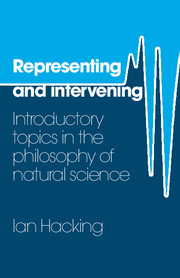Book contents
- Frontmatter
- Acknowledgements
- Contents
- Analytical table of contents
- Preface
- Introduction: Rationality
- Part A Representing
- Part B Intervening
- 9 Experiment
- 10 Observation
- 11 Microscopes
- 12 Speculation, calculation, models, approximations
- 13 The creation of phenomena
- 14 Measurement
- 15 Baconian topics
- 16 Experimentation and scientific realism
- Further reading
- Index
13 - The creation of phenomena
Published online by Cambridge University Press: 05 June 2012
- Frontmatter
- Acknowledgements
- Contents
- Analytical table of contents
- Preface
- Introduction: Rationality
- Part A Representing
- Part B Intervening
- 9 Experiment
- 10 Observation
- 11 Microscopes
- 12 Speculation, calculation, models, approximations
- 13 The creation of phenomena
- 14 Measurement
- 15 Baconian topics
- 16 Experimentation and scientific realism
- Further reading
- Index
Summary
One role of experiments is so neglected that we lack a name for it. I call it the creation of phenomena. Traditionally scientists are said to explain phenomena that they discover in nature. I say that often they create the phenomena which then become the centrepieces of theory.
The word ‘phenomenon’ has a long philosophical history. In the Renaissance some astronomers tried to ‘save the phenomena’, that is, produce a system of calculation that would fit known regularities. Not everyone admired that. Who will beat Francis Bacon's scorn when he writes, in a 1625 essay, Superstition: ‘They are like astronomers, who did feign eccentrics and epicycles, and such engines of orbs, to save the phenomena; though they knew, there were no such things.’ Yet the great French historian and philosopher of science, the eminent anti-realist Pierre Duhem, would admiringly take the same tag to name one of his books, To Save the Phenomena (1908). Bas van Fraassen recycles it for a chapter title in his book, The Scientific Image. Such authors teach that a theory provides a formalism to embed the phenomena within a coherent order, but the theory, where it extends beyond the phenomena, indicates no reality. They take for granted that the phenomena are discovered by the observer and the experimenter. How then can I say that a chief role for experiment is the creation of phenomena?
Information
- Type
- Chapter
- Information
- Representing and InterveningIntroductory Topics in the Philosophy of Natural Science, pp. 220 - 232Publisher: Cambridge University PressPrint publication year: 1983
Accessibility standard: Unknown
Why this information is here
This section outlines the accessibility features of this content - including support for screen readers, full keyboard navigation and high-contrast display options. This may not be relevant for you.Accessibility Information
- 1
- Cited by
